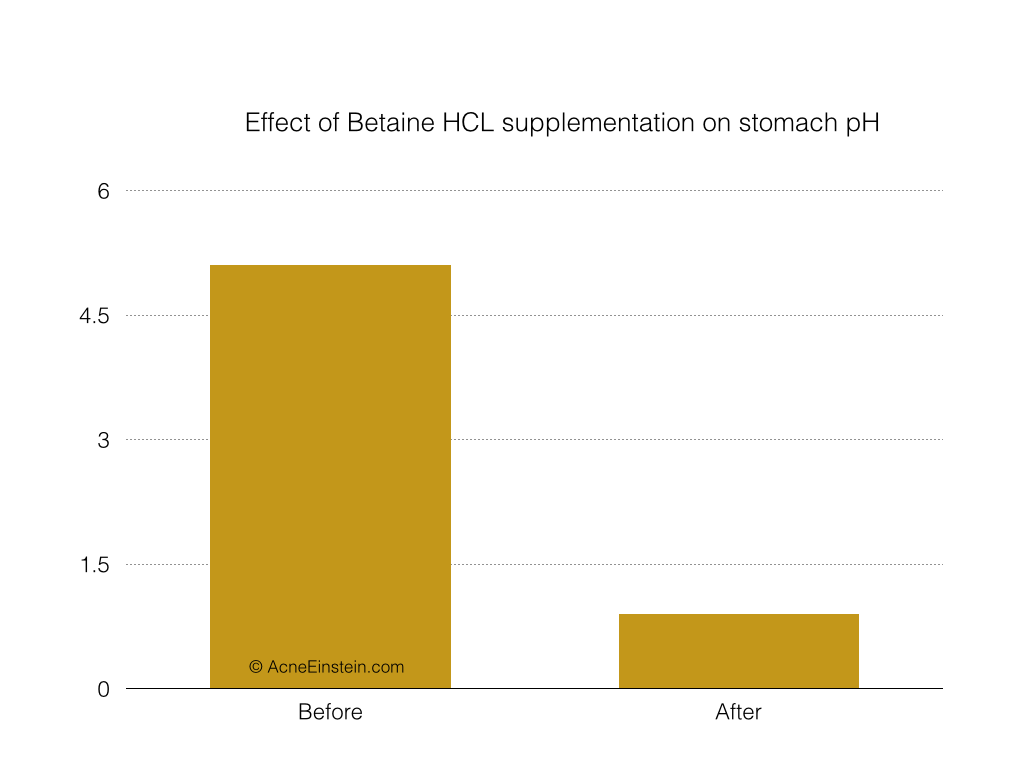Here we’ll look at various ways to support your digestion and reduce the amount of fermentable residue for bacteria to munch on.
These aren’t as critical as prokinetics to support motility and should be used ‘as needed’. Without getting yourself checked by a doctor, it’s tough to know what, if any, of these you need. I’m listing these as options for you to consider.
Stomach acid
Stomach acid is crucial for a healthy gut. It kills bacteria in food and prevents bacteria from passing through the stomach into the small intestine. Low stomach acid is one of the most important risk factors for SIBO. And taking drugs that reduce stomach acid secretion (proton pump inhibitors, PPI) often lead to SIBO. In fact, a 1996 study showed that bacteria concentration in the upper part of the small intestine increase by whopping 287 fold in people who took proton pump inhibitors. PPIs suppress stomach acid production and are used to treat GERD, acid reflux, and gastric ulcers.
Fortunately, boosting stomach acid is easy with common over the counter supplements, namely betaine hydrochloric (HCL) acids.
A 2013 study showed that betaine HCl supplements quickly reduces gastric (stomach) pH. In the study six volunteers were given a drug known to increase gastric pH. They were also given 1500 mg of betaine HCl and the gastric pH was monitored with Heidelberg pH capsule.
This graph shows gastric pH before and after 1500 mg betaine HCl supplementation.

Source: Yago, M. R. et al. Gastric reacidification with betaine HCl in healthy volunteers with rabeprazole-induced hypochlorhydria.Mol. Pharm. 10, 4032–7 (2013). https://www.ncbi.nlm.nih.gov/pubmed/23980906
pH level dropped within 15 minutes of supplementation and stayed below 1 for more than an hour.
The researchers concluded:
The results of this pilot study have shown that BHCl [betaine HCl] can be used as an effective method to rapidly and temporarily lower gastric pH in healthy volunteers.
Yago, M. R. et al. Gastric reacidification with betaine HCl in healthy volunteers with rabeprazole-induced hypochlorhydria.Mol. Pharm. 10, 4032–7 (2013). https://www.ncbi.nlm.nih.gov/pubmed/23980906
Dosage
I found 2 studies that investigated betaine HCl supplementation to reduce gastric pH. Both used 1500 mg dosages (apparently it provides sufficient amount of acid to acidify normal human stomach). Neither of the studies reported any adverse effects with 1500 mg dose of betaine HCl.
That being said, in both studies, the HCl supplements were taken on an empty stomach. It’s likely that you need a higher dose when taking HCl with meals. Unfortunately, I couldn’t find any scientific studies on HCl supplementation with meals.
Many websites that specialize in digestive problems recommend something along these lines. This comes from SCDLifestyle.com.
- Eat a meal that contains at least 15-20grams of protein (about 4-6ounces of meat).
- Start by taking 1 pill (650mg or less) of Betaine HCL during the beginning of the meal.
- Finish the meal as normal and observe your body for any changes in feeling associated with the stomach and belly button area. Things to look for: heaviness, hotness, burning, or other GI distress.
- Stay at this dosage of 1 pill for another day of meals with protein and if you don’t notice anything on the 3rd day, try 2 pills.
- Stay there for another day and then try 3 pills.
- Keep increasing the number of pills taken with each meal until you notice some GI discomfort described in step #3.
- When this happens, you will know your ideal Betaine HCL dosage is 1 pill less. For example, if you felt the discomfort going from 5 pills to 6 pills, then 5 pills is your proper dosage for a normal meal.
- Over time you’ll notice some burning with this dose. When that happens, reduce the dose by 1 pill.
While choosing an HCl supplement, get one that also contains pepsin. Apparently, people who don’t produce enough HCl often also produce too little pepsin.
Here are some brands to try:
- Now Foods, Betaine HCL, 648 mg
- Doctor’s Best, Betaine HCl, Pepsin & Gentian Bitters (best value)
- Thorne Research, Betaine HCL & Pepsin
Other things to note when supplementing:
- Don’t take HCl with meals that contain little to no protein.
- People who take anti-inflammatory drugs (such as NSAIDs) shouldn’t take HCl as these drugs can damage the stomach lining.
I recommend reading the following articles before supplementing with HCL:
Acidic beverages
The above study referred to earlier studies that had used acidic beverages (Coca Cola) to lower stomach pH and improve absorption of acid-dependent medications. Apparently, drinking a glass of Coke also reduces stomach pH, but it’s not nearly as effective as taking Betaine HCl supplements. Furthermore, constant acid exposure can harm your teeth and throat.
However, this could explain why some people say drinking apple cider vinegar before a meal has health benefits. In this case, any acidic beverage would work. It’s an option, one that I don’t recommend, for people who don’t want to take HCl supplements.
Digestive enzymes
Digestive enzymes help to break down foods into smaller particles the body can absorb. For example, they help to break down long starches into simple sugars. In doing so, they reduce the amount of substances available for bacterial fermentation.
They can be helpful when you eat foods that are hard to digest, such as beans, legumes, and tough vegetables (like broccoli and cauliflower).
In his book Fast Track Digestion Dr. Robillard recommends taking digestive enzymes whenever you eat such foods, but especially when eating beans. Customer reviews for enzyme supplements often state they reduce gas, bloating, and discomfort after meals.
I have personally used this product and found that it worked nicely: Now Foods, Digest Ultimate, 120 Veggie Caps
You can also try a product called Beano, available from Walmart, Walgreens and many other stores.
Herbal digestive aids
Since time immemorial humans have used different herbal preparations to improve digestion and reduce indigestion. For example, it’s common in many European countries to enjoy a ‘digestif’ drink after a good meal (read: a heavy meal). These preparations usually contain bitter herbs that stimulate stomach acid and bile secretion. They can also include herbs that reduce or dissipate intestinal gas.
In fact, these bitters can be described as eupeptics (from Greek eu: well and pepsis: digestion) promoting gastric juice secretion and facilitating digestion.
McMullen, M. K., Whitehouse, J. M. & Towell, A. Bitters: Time for a New Paradigm. Evid Based Complement Alternat Med 2015, 670504 (2015). https://www.ncbi.nlm.nih.gov/pubmed/26074998
Herbs that improve digestion can be divided into three groups: bitters (stimulate stomach acid), choleretics (stimulate bile), carminatives (reduce intestinal gas).
Herbs often have multiple effects, and one herb can act both as a bitter and choleretic. So it doesn’t make sense to recommend herbs for each of the three categories. A textbook in herbal medicine recommends the following herbs for digestive issues.
- Gentian
- Centaury
- Quassia (bitterwood)
- Wormwood (abshint)
- Ginger
- Blessed thistle (holy thistle)
- Bitter-orange peel
- Caraway
- Artichoke
- Boldo (Peumus boldus)
- Turmeric
- Dandelion
- Celandine (greater celandine)
There are countless of herbs that may stimulate bile and gastric acid, so the above list is by no means exhaustive.
I managed to find published human studies for only a handful of the above. Herbs with human studies supporting their use in dyspepsia (indigestion) include:
- Ginger
- Artichoke leaves
- Turmeric
Here are a few products that seem to have a promising ingredient blend:
- A Vogel, Liver Gallbladder Drops (my choice)
- Pioneer Nutritional Formulas, Digestive Enzymes & Herbs (also a good choice, contains herbs and digestive enzymes)
- Planetary Herbals, Digestive Grape Bitters
- Gaia Herbs, SystemSupport, Para-Shield
I can’t say which of those works the best, but based on ingredient blend I would go with A Vogel’s Liver Gallbladder Drops or Pioneer’s Digestive Enzymes & Herbs.
There are also some herbal tea blends that could work, such as these:

